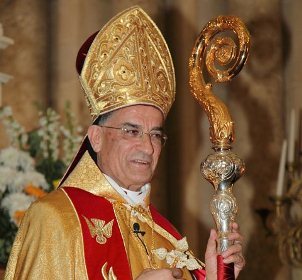
by NAJIA HOUSSARI — arabnews.com — BEIRUT: Maronite Patriarch Bechara Boutros Al-Rahi has reiterated the necessity of implementing the Taif Agreement, international resolutions and the removal of illegal weapons from Lebanon. The Taif Agreement, signed in 1989, aimed to provide “the basis for the end of the civil war and the return to political normality in Lebanon.” Al-Rahi’s points are the demands mentioned in a paper handed last week to Lebanese authorities by Kuwait’s Foreign Minister Sheikh Ahmed Nasser Al-Sabah as the conditions for rebuilding trust between the Gulf states and Lebanon, after Saudi Arabia and others severed diplomatic and economic relations with Beirut. Al-Rahi reiterated his demand for “holding an international conference, announcing Lebanon’s neutrality and finding a solution to the problem of Syrian and Palestinian refugees.”
He said he was surprised by former Prime Minister Saad Hariri’s decision to suspend his involvement in political activities and his call to the Future Movement to neither contest the upcoming parliamentary elections nor nominate anyone to run on its behalf. He told a delegation of the Union of Editors: “I was surprised by the decision and did not expect it, as Hariri is moderate and I hope it does not lead to any crack in the Lebanese structure.” Earlier, Hariri said: “There is no room for any positive opportunity for Lebanon in light of Iranian influence, international confusion, national division, the rise of sectarian tensions and the deterioration of the state.” Parliament Speaker Nabih Berri said he was “saddened by Hariri’s decision,” and the leader of the Progressive Socialist Party Walid Jumblatt said he felt “orphaned.”
Lebanese Forces leader Samir Geagea said: “Despite our differences with Saad Hariri on political vision and power-sharing, I cannot but personally sympathize with him,” while stressing his “respect and appreciation for friends and brothers in the Future Movement.” He said he would continue to coordinate with the Sunni community and other sects that believe in the Lebanese cause until Lebanon succeeds as a sovereign and independent state not controlled by Iran. Grand Mufti Sheikh Abdul Latif Derian said: “Hariri’s step is regrettable and painful after all his efforts in his national missions.” He expressed “concern over the developments on the Lebanese scene” and affirmed that “Lebanon’s relations with its Arab brothers, especially the Gulf Cooperation Council states and primarily Saudi Arabia, must be at the highest level.” He said the Lebanese people should be convinced that no group should harm these “brotherly relations,” in order to protect Lebanese and Arab interests.
In a joint statement, several economic bodies called on “political powers to assume their national responsibilities and take steps to stop the collapse and disintegration of the state, in order to restore the work of the state and its legitimate institutions, and to consolidate Lebanon’s stability, role and identity.”



